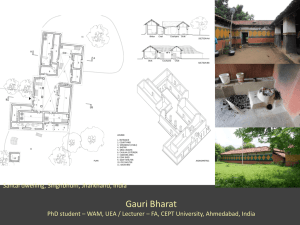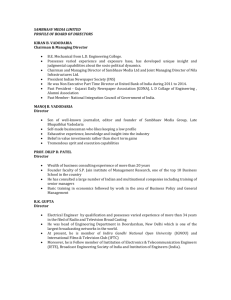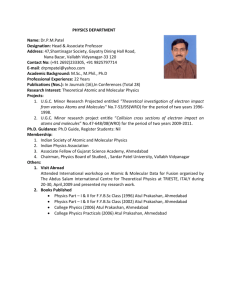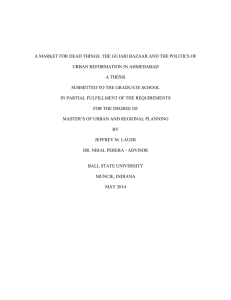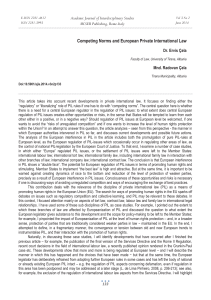ABSTRACT THESIS: STUDENT:
advertisement
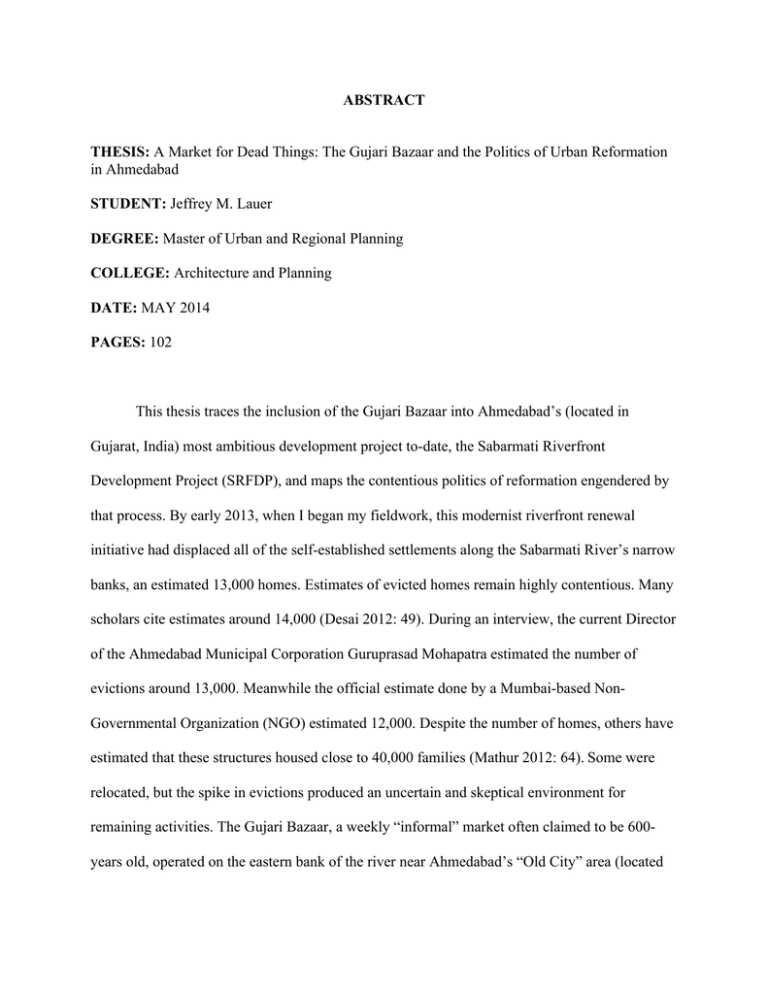
ABSTRACT THESIS: A Market for Dead Things: The Gujari Bazaar and the Politics of Urban Reformation in Ahmedabad STUDENT: Jeffrey M. Lauer DEGREE: Master of Urban and Regional Planning COLLEGE: Architecture and Planning DATE: MAY 2014 PAGES: 102 This thesis traces the inclusion of the Gujari Bazaar into Ahmedabad’s (located in Gujarat, India) most ambitious development project to-date, the Sabarmati Riverfront Development Project (SRFDP), and maps the contentious politics of reformation engendered by that process. By early 2013, when I began my fieldwork, this modernist riverfront renewal initiative had displaced all of the self-established settlements along the Sabarmati River’s narrow banks, an estimated 13,000 homes. Estimates of evicted homes remain highly contentious. Many scholars cite estimates around 14,000 (Desai 2012: 49). During an interview, the current Director of the Ahmedabad Municipal Corporation Guruprasad Mohapatra estimated the number of evictions around 13,000. Meanwhile the official estimate done by a Mumbai-based NonGovernmental Organization (NGO) estimated 12,000. Despite the number of homes, others have estimated that these structures housed close to 40,000 families (Mathur 2012: 64). Some were relocated, but the spike in evictions produced an uncertain and skeptical environment for remaining activities. The Gujari Bazaar, a weekly “informal” market often claimed to be 600years old, operated on the eastern bank of the river near Ahmedabad’s “Old City” area (located adjacent to Ellis Bridge and around the Mahalaxmi Mandir) throughout these evictions. Fearing removal, representatives of the Gujari Bazaar, including external actors, filed a Public Interest Litigation (PIL) to secure its future. By 2012, the PIL was settled and the Gujarat Supreme Court ordered that the market be included and given a new space. Early 2013 was a time of greater security for the market. My field research lasted for four months from February to May. Research methods were largely ethnographic, including participant observation and in-depth field interviews. In order to make a compelling case in the PIL, the representatives of the Gujari Bazaar argued that it was a piece of historical value and part of Ahmedabad’s heritage. The new spatial context of the market and its “thematic programing,” however, suggests contesting visions of “heritage,” and provokes the question, “what does heritage mean in the simultaneous preservation and consumption of the past and the perception of cultural authenticity in light of a substantial modernist reimagining of city space? Contesting notions of heritage supplied the terms for both Gujari’s inclusion in and co-option by the Sabarmati Project. Despite a larger discourse of inclusion and social justice, the process of Gujari’s absorption in the Sabarmati Project was not internally consistent or harmonious. The uncertain environment of forced evictions and legal contest produced a new set of contesting relations within the market. The PIL painted a simplistic and ultimately romantic narrative of dominance and resistance that sanitized these internal politics. It placed the Ahmedabad Gujari Association (AGA), especially its president Nafis, as the representative of all market vendors. However, during my fieldwork several of my informants rumored that Nafis was corrupt and the AGA’s management incompetent. Conceptualizing rumor as a social register of dissent, I explore the social life of these rumors and argue that Gujari is in a state of fundamental political realignment and negotiating its own modernity. Rumor is a subterranean cultural architecture that provides the basis for an internal discourse on representation, power, and community morality. In addition, this complex internal discourse reveals the collective agency of market vendors and effaces the simplistic narratives of a united struggle for inclusion and suggests that the PIL process was an effort driven by elite actors unintentionally harnessing the power to speak on the market’s behalf.
